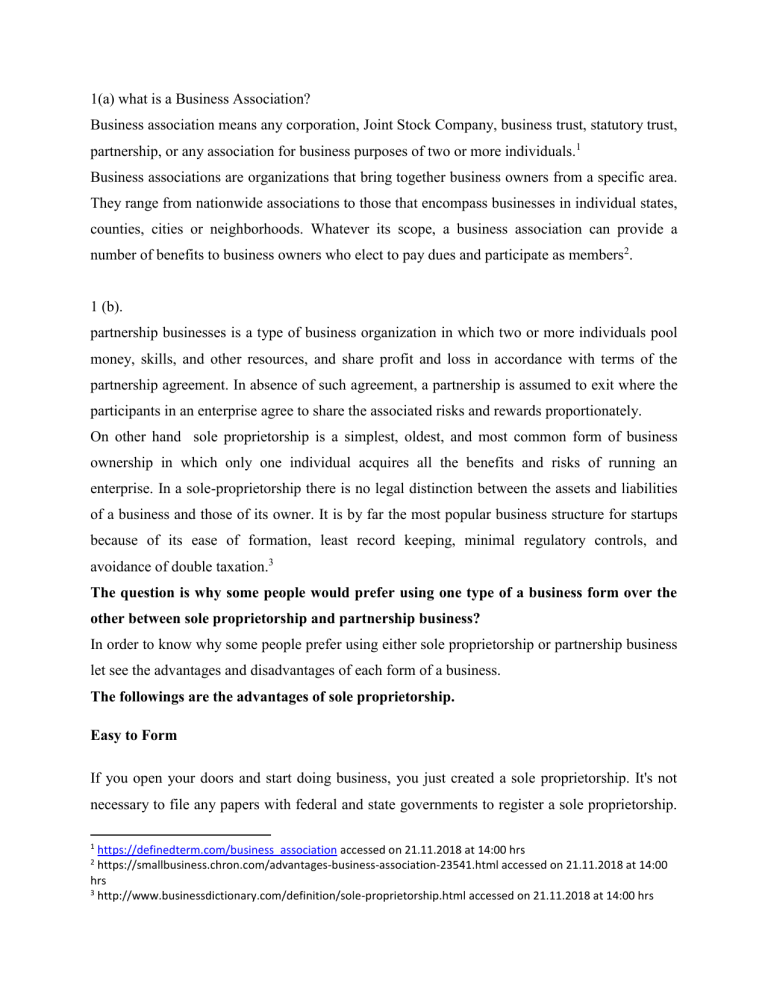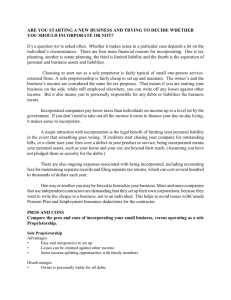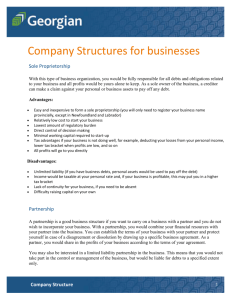bussiness law assignment
advertisement

1(a) what is a Business Association? Business association means any corporation, Joint Stock Company, business trust, statutory trust, partnership, or any association for business purposes of two or more individuals.1 Business associations are organizations that bring together business owners from a specific area. They range from nationwide associations to those that encompass businesses in individual states, counties, cities or neighborhoods. Whatever its scope, a business association can provide a number of benefits to business owners who elect to pay dues and participate as members2. 1 (b). partnership businesses is a type of business organization in which two or more individuals pool money, skills, and other resources, and share profit and loss in accordance with terms of the partnership agreement. In absence of such agreement, a partnership is assumed to exit where the participants in an enterprise agree to share the associated risks and rewards proportionately. On other hand sole proprietorship is a simplest, oldest, and most common form of business ownership in which only one individual acquires all the benefits and risks of running an enterprise. In a sole-proprietorship there is no legal distinction between the assets and liabilities of a business and those of its owner. It is by far the most popular business structure for startups because of its ease of formation, least record keeping, minimal regulatory controls, and avoidance of double taxation.3 The question is why some people would prefer using one type of a business form over the other between sole proprietorship and partnership business? In order to know why some people prefer using either sole proprietorship or partnership business let see the advantages and disadvantages of each form of a business. The followings are the advantages of sole proprietorship. Easy to Form If you open your doors and start doing business, you just created a sole proprietorship. It's not necessary to file any papers with federal and state governments to register a sole proprietorship. 1 https://definedterm.com/business_association accessed on 21.11.2018 at 14:00 hrs https://smallbusiness.chron.com/advantages-business-association-23541.html accessed on 21.11.2018 at 14:00 hrs 3 http://www.businessdictionary.com/definition/sole-proprietorship.html accessed on 21.11.2018 at 14:00 hrs 2 However, depending on local regulations, you may need to obtain a business license or a certificate of occupancy. If you operate the business in a name other than your own, you may need to register the name of your company as a DBA (doing business as) name.4 Less Paperwork Required Unlike corporations and partnerships, sole proprietors are not required to file any articles of incorporation, exhibits or annual reports when they start businesses. You do not have to pay legal fees to a lawyer to get your business started. The operations of the business are private and not subject to public disclosure because a sole proprietorship does not file any registration documents or annual reports with federal or state governments. 5 Owner Has Complete Control The owner controls everything that goes on in the business and does not have to seek the approval of a board of directors, stockholders or anyone else. The owner does all the hiring and firing and makes all the decisions. However, an owner should consider whether being the sole decision-maker would be a burden. If that is the case, a partnership might be a better business structure choice. Sole proprietorships have only one owner, but they are allowed to have employees. A sole proprietor owner who decides to close the business can sell all the assets and turn out the lights. Getting permission from other people is unnecessary.6 4 https://smallbusiness.chron.com/five-advantages-sole-proprietorship-22896.html accessed on 21.11.2018 at 14:00 hrs 5 ibid 6 ibid All Income Goes to Owner Sole proprietors keep all the profits of the business to themselves. They do not have to share the income with other stockholders or investors.7 Tax Filings Are Simple All the income of the business is taxed on the owner's personal tax return. The company is not taxed as a separate entity. In general, the only tax form needed is Schedule C, which is filed with the IRS along with the owner's tax return.8 If you want to get your business started quickly and with little cost, a sole proprietorship may be the answer. It's simple to form and doesn't require the filing of any registration documents with federal and state governments. The owner retains all the profits and doesn't have to answer to anyone for his decisions.9 The disadvantages of sole proprietorship are as follows. Owners are fully liable. If business debts become overwhelming, the individual owner’s finances will be impacted. When a sole proprietorship fails to pay its debts, the owner’s home, savings, and other individual assets can be taken to satisfy those debts.10 Self-employment taxes apply to sole proprietorships. Owners must pay self-employment taxes on the business income.11 Business continuity ends with the death or departure of the owner. Because the owner and the sole proprietorship are one, if the owner dies or becomes incapacitated then the business dies with them and the money and assets of the business become part of the individual's estate. The 7 ibid ibid 9 ibid 10 https://www.legalmatch.com/law-library/article/advantages-and-disadvantages-of-sole-proprietorships.html accessed on 21.11.2018 at 14:00 hrs 11 ibid 8 assets and money are subjected to inheritance taxes and can have a great impact on employees of the sole proprietorship.12 Raising capital is difficult. Initial funds of the business are generated by the owner and raising funds for the business can be hard since they cannot issue stocks or other investment income. Loans may also be difficult if the owner does not have enough credit to secure additional money.13 On other hand advantages of partnership form of business are as follows. People choose partnership form of business due to its advantages which are as follows14 1. two heads (or more) are better than one 2. your business is easy to establish and start-up costs are low 3. more capital is available for the business 4. you’ll have greater borrowing capacity 5. high-caliber employees can be made partners 6. there is opportunity for income splitting, an advantage of particular importance due to resultant tax savings 7. partners’ business affairs are private 8. there is limited external regulation 9. it’s easy to change your legal structure later if circumstances change. Disadvantages of partnership form of business. Some individuals opt not to be partners in a business due to disadvantages of this form of business which are15 : 1. the liability of the partners for the debts of the business is unlimited 12 ibid ibid 14 https://www.business.tas.gov.au/starting-a-business/choosing-a-business-structure-intro/partnershipadvantages-and-disadvantages accessed on 21.11.2018 at 14:00 hrs 13 15 https://www.business.tas.gov.au/starting-a-business/choosing-a-business-structure-intro/partnershipadvantages-and-disadvantages accessed on 21.11.2018 at 14:00 hrs 2. each partner is ‘jointly and severally’ liable for the partnership’s debts; that is, each partner is liable for their share of the partnership debts as well as being liable for all the debts 3. there is a risk of disagreements and friction among partners and management 4. each partner is an agent of the partnership and is liable for actions by other partners 5. if partners join or leave, you will probably have to value all the partnership assets and this can be costly. Conclusion. Therefore people choose partnership due to the following reasons two heads (or more) are better than one, your business is easy to establish and start-up costs are low, more capital is available for the business, you’ll have greater borrowing capacity, high-caliber employees can be made partners, there is opportunity for income splitting, an advantage of particular importance due to resultant tax savings, partners’ business affairs are private, there is limited external regulation Other people prefer sole proprietorship because partnership form of business is having the following challenges the liability of the partners for the debts of the business is unlimited, each partner is ‘jointly and severally’ liable for the partnership’s debts; that is, each partner is liable for their share of the partnership debts as well as being liable for all the debts, there is a risk of disagreements and friction among partners and management, each partner is an agent of the partnership and is liable for actions by other partners, if partners join or leave, you will probably have to value all the partnership assets and this can be costly. They prefer sole proprietorship because they are Easy to Form, Less Paperwork Required, Owner Has Complete Control, All Income Goes to Owner, tax filings are simple. Bibliography. Books. Davis, P.L., [1998] Gower’s Principles of Modern Company Law, 6th Ed] Sweet and Maxwell Farrar, J.H. and Hanningan, B.M., [1998] Farra’s Company Law, [11th Ed] Butterworth’s London Mayson, S et al, [1999] Mayson, French & Ryan on Company Law, [11th Ed] Blackstone Press Ltd, London Monks R.A.D and Minow, N., [1995] Corporate Governance,Blackwell,Cambridge Online sources. https://definedterm.com/business_association accessed on 21.11.2018 at 14:00 hrs https://smallbusiness.chron.com/advantages-business-association-23541.html accessed on 21.11.2018 at 14:00 hrs http://www.businessdictionary.com/definition/sole-proprietorship.html accessed on 21.11.2018 at 14:00 hrs https://smallbusiness.chron.com/five-advantages-sole-proprietorship-22896.html accessed 21.11.2018 at 14:00 hrs https://www.business.tas.gov.au/starting-a-business/choosing-a-business-structureintro/partnership-advantages-and-disadvantages accessed on 21.11.2018 at 14:00 hrs on




